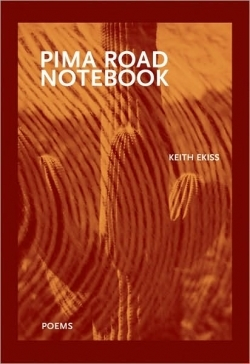Pima Road Notebook
Keith Ekiss’s debut poetry collection, Pima Road Notebook, takes readers on a personal journey into the American cityscape of the desert Southwest. Set in southern Arizona, home of the Pima tribe of Native Americans, Ekiss’s poems delve into the uneasy history of a land and its man-made landscape through the speaker’s experiences as a transplant in this foreign place with his family. In simple, accurate language, the poet summons both the natural and created worlds with deep understanding, revealing the tension between a place’s history and our personal desires.
Ekiss begins by plunging readers into the surreal landscape of a desert paved over and planted with lawns. His opening poem, “State Fair,” presents the history the casual outsider is supposed to accept: “the model homes assuring buyers / no one had ever lived here before.” To counter that view, he describes the bent willow and cottonwood homes of the Pima people in “Pima Houses (c. 1850)” and experiences his own disjunctions with place in “Field Trip.” In that poem, perhaps the most moving of the first section, the speaker describes visiting the tribal museum and staring at a photo of “a boy / trapped deep within the spiral of a maze, / lost or at home, I couldn’t say.”
The poems then drive deep into the history of the desert, the Pima, and white man’s desire to master the land. In “Paradise Valley,” which chronicles the move west by the speaker’s family, and “Comic Book West,” in which the romance of the West is illuminated, readers see the reason for following the sunset to a new home. Yet, in later poems, readers see how that romance had little to do with loving the land or taking cues from the Pima who had made it sustainable for generations. In “Elegy for a Ghost Town,” he writes that the ghost towns are “such a part of the landscape, / it’s no surprise they no longer exist.”
In the final third of the collection, the speaker looks at his family’s time in the desert as “tourists to the lives / we put behind us” (“The Movers”) and sees “the long forgotten emerging as new” (“Monsoon Return”). In seeing with these new eyes, Ekiss in “Pictures of Houses” gives readers a revised symbolism for the desert (“garden hose curled to a western lasso”) and remembers in “Summer, Tucson” the joy of a mirage (“hope so close I could swim in it.”) But there is also pain in these revelations. The title poem “Pima Road Notebook” begins, “No one ever told me I belong to the earth.” And herein lies the devastating circle that Ekiss so eloquently delineates in this quiet, powerful collection.
Reviewed by
Jennifer Fandel
Disclosure: This article is not an endorsement, but a review. The publisher of this book provided free copies of the book and paid a small fee to have their book reviewed by a professional reviewer. Foreword Reviews and Clarion Reviews make no guarantee that the publisher will receive a positive review. Foreword Magazine, Inc. is disclosing this in accordance with the Federal Trade Commission’s 16 CFR, Part 255.

